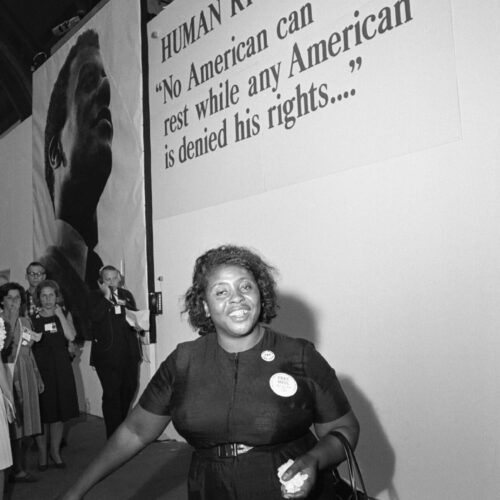Biography
Early Life
Fannie Lou Hamer’s powerful voice as a civil rights activist amplified the concerns of southern Black women in their pursuit of equality and social justice. Fannie Lou Townsend grew up in Sunflower County, Mississippi, where she began working as a picker in the cotton fields at just six years old.
Her literacy and adept knowledge of the Marlow Plantation provided her with a promotion keeping records for the owner. She continued this work after marrying Perry Hamer in 1945, until an attempt to enact her rights as a citizen changed her life forever.
Organized Activism
In 1962, she suffered severe retaliation threats after trying to vote in the local election. The subsequent events prompted Hamer to become involved in the organizational structure of the civil rights movement, quickly rising to leadership and international recognition.
The Black church, a central organizing space of the civil rights movement, was the venue where Hamer made her debut as a leading voice for political and social rights for African Americans. She used her platform to declare her faith and political beliefs to audiences across the nation.
At a National Council of Negro Women meeting, she declared. “I strictly believe in Christianity.”
Civil Rights Memberships
Hamer served as the field secretary of the Student Nonviolent Coordinating Committee (SNCC) beginning in 1963, and the next year was a founding member of the Mississippi Freedom Democratic Party (MFDP).
Her work with the MFDP propelled her into the national spotlight as their delegate to the Democratic National Convention. She famously declared in her 1964 testimony, “…we want to register [to vote], to become first-class citizens…Is this the America, land of the free and the home of brave, where we have to sleep with our telephones off the hook because our lives are threatened daily, because we want to live as decent human beings, in America?”
Hamer maintained her commitment to expanding voting rights for African Americans throughout her life and received many public accolades for her dedication, including an honorary membership to Delta Sigma Theta and an honorary degree from Tougaloo College.
Hamer advocated for faith in action, as she explained at a Negro Baptist School meeting, “All we have to do is trust God and launch out into the deep. You can pray until you faint, but if you don’t get up and try to do something, God is not going to put it in your lap.”
Fannie Lou Hamer’s faith was always a central part of her organizing efforts and political advocacy to secure voting rights for African Americans at the height of the civil rights movement.

